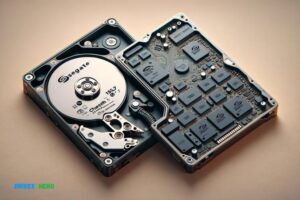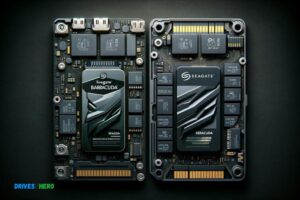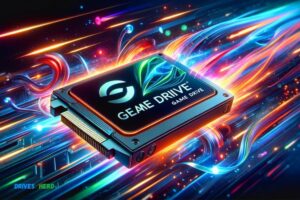Seagate Firecuda Sshd Vs Ssd: Which One Is Superior?
When comparing the Seagate FireCuda SSHD (Solid State Hybrid Drive) to an SSD (Solid State Drive), it’s essential to consider the specific needs and use cases.
The FireCuda SSHD combines both traditional hard disk drive (HDD) and solid-state drive technologies, offering a balance between storage capacity and faster performance.
It utilizes a small SSD cache to store frequently accessed data, enhancing speed for commonly used applications.
On the other hand, a standard SSD provides consistent high-speed performance but typically at a higher cost per gigabyte compared to an SSHD.
If you prioritize a blend of capacity and improved performance without breaking the bank, the FireCuda SSHD might be a suitable choice.
Key Takeaway
Key Differences Between Seagate Firecuda Sshd And Ssd
The Seagate Firecuda SSHD provides a cost-effective solution with a mix of HDD and SSD capabilities, offering increased storage capacity and improved performance compared to traditional hard drives.
SSDs deliver superior speed and durability due to their lack of mechanical parts. The Seagate Firecuda SSHD and SSD are both popular storage options, but they have some key differences in terms of performance, storage capacity, and price.
Here’s a simple comparison table between Seagate FireCuda SSHD and SSD (Solid State Drive):
| Feature | Seagate FireCuda SSHD | SSD (Solid State Drive) |
|---|---|---|
| Storage Type | Hybrid (SSHD) | Solid State (SSD) |
| Capacity | Commonly 1TB and 2TB | Ranges from 128GB to 4TB and above |
| Interface | SATA | SATA, PCIe, M.2, NVMe |
| Speed | Read speeds: Up to 140MB/s, Write speeds: Varies | Read/write speeds: 200MB/s to 5500MB/s |
| Data Transfer Rate | Up to 6Gb/s (SATA) | Up to 32Gb/s (NVMe) |
| Cache Memory | 8GB NAND Flash | None (reliant on NAND storage) |
| Average Seek Time | About 8.5ms | Typically under 0.1ms |
| Power Consumption | Lower than traditional HDDs, higher than SSDs | Lowest among storage devices |
| Durability & Reliability | Good with integrated SSD-type components | Very high due to no moving parts |
| Price | Cheaper than SSDs | More expensive than SSHDs |
| Best Use | Gaming, general performance boost | High-performance computing, gaming, work |
Performance Comparison:
- SSHD (Solid State Hybrid Drive): Utilizes both the speed of an SSD and the capacity of an HDD. It has a small SSD cache that stores frequently accessed data, enabling faster access times.
- SSD (Solid State Drive): Offers lightning-fast read and write speeds, resulting in significantly improved overall performance. With no moving parts, it’s also less prone to mechanical failures.
Storage Capacity Comparison:
- SSHD: Provides larger storage capacities compared to SSDs. With options ranging from 1TB to 4TB, it’s an ideal choice if you require ample storage for your files, games, and applications.
- SSD: Available in various capacities, but typically offers lower storage capacities compared to SSHDs. Common options include 128GB, 256GB, 512GB, and 1TB. It’s best suited for users who prioritize speed over storage capacity.
Price Comparison:
- SSHD: Generally more affordable than SSDs, making it a budget-friendly option for users who need large storage capacities without breaking the bank.
- SSD: Typically higher in price due to its superior performance and reliability. While it may cost more, you’ll benefit from faster load times and increased productivity.
If you prioritize speed and performance, an SSD is the way to go. On the other hand, if you require large storage capacities at a more budget-friendly price point, the SSHD is worth considering.
Assess your specific needs and budget constraints to determine which option is the best fit for you.
Speed And Performance Of Seagate Firecuda Sshd
Experience lightning-fast speed and exceptional performance with the Seagate Firecuda SSHD, a powerful solution that rivals traditional SSDs.
Its cutting-edge technology ensures faster boot times, quicker load speeds, and improved overall system responsiveness, making it an excellent choice for those seeking enhanced performance.
Explanation Of How Seagate Firecuda Sshd Works
The Seagate Firecuda SSHD combines the best of both worlds with its unique design that brings together the benefits of a traditional hard drive and a solid-state drive.
Here’s how it works:
- Adaptive Memory Technology: The Firecuda SSHD utilizes adaptive memory technology to automatically identify frequently accessed files and programs. By storing these high-priority files in solid-state memory, it significantly reduces load times and improves overall performance.
- NAND Flash: The Firecuda SSHD incorporates NAND flash storage, which delivers faster access times compared to traditional spinning disks. This allows for quick retrieval of data, resulting in snappier application launches and improved system responsiveness.
- Multi-Tier Caching: Firecuda SSHD uses multi-tier caching to smartly handle data between its hard drive and solid-state memory components. It dynamically identifies and stores frequently accessed files in the faster cache, optimizing performance based on usage patterns.
- Large Storage Capacity: One of the advantages of the Firecuda SSHD is its large storage capacity. It offers generous storage space, allowing you to store a vast collection of files, applications, and multimedia content without compromising on performance.
Benefits Of Using Seagate Firecuda Sshd
The Seagate Firecuda SSHD offers several advantages over traditional hard drives and even solid-state drives.
Here are some key benefits:
- Improved Speed: With the combination of solid-state memory and a traditional hard drive, the Firecuda SSHD provides faster load times and improved overall system speed. It offers the best of both worlds, giving you the benefits of an SSD while offering a larger storage capacity.
- Cost-Effective Solution: Compared to pure SSDs, the Firecuda SSHD offers a more cost-effective solution for users who require ample storage space without sacrificing performance. It provides a balance between speed and affordability.
- Easy Upgrade: Upgrading to a Firecuda SSHD is hassle-free. It operates seamlessly with existing systems and requires no additional software or driver installations. Simply replace your old hard drive with the Firecuda SSHD, and you’re good to go.
- Enhanced Gaming Experience: Gamers can benefit greatly from the Firecuda SSHD, as it reduces game load times and provides smoother gameplay. With faster data access, you can dive into your favorite games without any lag or delays.
- Reliable Storage: Seagate is known for its reliable storage solutions, and the Firecuda SSHD is no exception. It offers the same durability and reliability as traditional hard drives, ensuring that your data is safe and secure.
The Seagate Firecuda SSHD combines the speed of SSDs with the large storage capacity of traditional hard drives.
Its adaptive memory technology, NAND flash storage, and multi-tier caching provide improved speed and performance, making it an excellent choice for users seeking a balance between affordability and performance.
Speed And Performance Of Ssds
SSD’s speed and performance outshine the Seagate Firecuda SSHD, delivering lightning-fast data access and superior overall efficiency.
With its advanced technology, the SSD ensures optimal performance, ideal for those seeking top-notch speed and reliability in their storage solution.
SSDs (Solid State Drives) have become increasingly popular in recent years due to their superior speed and performance compared to traditional hard drives.
They offer a significant improvement in terms of data access, making them a valuable choice for users seeking faster and more efficient computing experiences.
Explanation Of How Ssds Work
- SSDs use NAND flash memory to store data, which is a type of non-volatile memory that retains information even when power is removed. This allows for fast and reliable data storage.
- Unlike traditional hard drives that rely on spinning disks and mechanical components, SSDs have no moving parts. This enables them to access data much faster, resulting in quicker boot times, file transfers, and application loading.
- SSDs contain an embedded controller that manages the storage and retrieval of data. The controller performs various optimization tasks, such as wear leveling and error correction, to ensure data integrity and extend the lifespan of the drive.
- The data in an SSD is stored in cells with readily accessible electrical charges. When you write data to an SSD, the controller determines which cells to store the data in and applies the necessary changes.
- When you retrieve data, the controller reads the charges from the cells and delivers the requested information.
- SSDs support advanced features like TRIM, which helps maintain the drive’s performance over time by allowing the operating system to inform the SSD which blocks of data are no longer in use.
Benefits Of Using Ssds
- Increased speed: SSDs are significantly faster than traditional hard drives. With faster boot times, quicker file transfers, and reduced application loading times, SSDs can greatly enhance your overall computing experience.
- Improved durability: Since SSDs have no moving parts, they are more resistant to physical shocks and vibrations. This makes them ideal for laptops and other portable devices that are prone to movement.
- Energy efficiency: SSDs consume less power than traditional hard drives, contributing to longer battery life for laptops and lower energy costs for desktop computers.
- Noise reduction: Without any spinning disks or moving components, SSDs operate silently, providing a quieter computing environment.
- Reliability: SSDs are less susceptible to data loss due to physical damage or mechanical failures. The absence of moving parts reduces the risk of a mechanical breakdown, making SSDs a reliable storage solution.
SSDs offer a vast improvement in speed, performance, durability, and power efficiency over traditional hard drives.
With their unique architecture and advanced features, SSDs have revolutionized the storage industry and continue to be the preferred choice for users seeking optimal computing experiences.
Value For Money Comparison
The Seagate Firecuda SSHD and SSD offer exceptional value for money, with their advanced technology and high-performance capabilities.
These storage options provide fast data access and efficient file loading, making them ideal choices for users seeking optimal speed and storage capacity for their devices.
Comparison Of The Value For Money Offered By Seagate Firecuda Sshd And Ssds
It’s essential to consider the value for money offered by each option. Let’s explore the factors that can help you make an informed decision.
Considerations For Choosing Between Seagate Firecuda Sshd And Ssds
When comparing the value for money provided by Seagate Firecuda SSHD and SSDs, the following considerations come into play:
- Storage Capacity: Seagate Firecuda SSHDs generally offer a larger storage capacity compared to SSDs at a similar price point. If you require ample storage for your files, games, or applications, an SSHD might be the better choice.
- Speed and Performance: SSDs are renowned for their lightning-fast speed and remarkable performance. They provide quicker boot times, faster file transfers, and a seamless user experience. If you prioritize speed in your storage solution, SSDs deliver top-notch performance.
- Cost Efficiency: Seagate Firecuda SSHDs provide a cost-effective balance between performance and price by combining solid-state caching with a traditional hard drive. For enhanced speed at an affordable cost, consider choosing an SSHD over a regular hard drive.
- Durability: SSDs have no moving parts, making them more resistant to physical shock and less prone to failure. They are designed to withstand rough conditions, making them a reliable choice for those seeking durable storage.
- Usage and Applications: For fast performance in gaming or resource-intensive tasks, opt for an SSD. If you need ample storage for multimedia at a more affordable price, consider an SSHD.
Choosing between Seagate Firecuda SSHD and SSDs ultimately depends on your specific needs and priorities. If you prioritize speed and performance, SSDs are the superior choice.
However, if you require more storage capacity at an affordable price point, Seagate Firecuda SSHDs offer excellent value for money.
Conclusion
After comparing the Seagate Firecuda SSHD and SSD, it is clear that both offer significant improvements in terms of speed and performance compared to traditional hard drives.
The Firecuda SSHD combines the best of both worlds, with the speed of an SSD and the storage capacity of an HDD. However, the SSD still surpasses the SSHD in terms of overall speed and reliability.
The Seagate Firecuda SSHD is a great option for those who require a large amount of storage, as it provides faster loading times for frequently accessed files and applications.
On the other hand, the SSD’s faster read and write speeds make it ideal for users who prioritize speed above all else. The choice between the Seagate Firecuda SSHD and SSD depends on individual needs and preferences.






